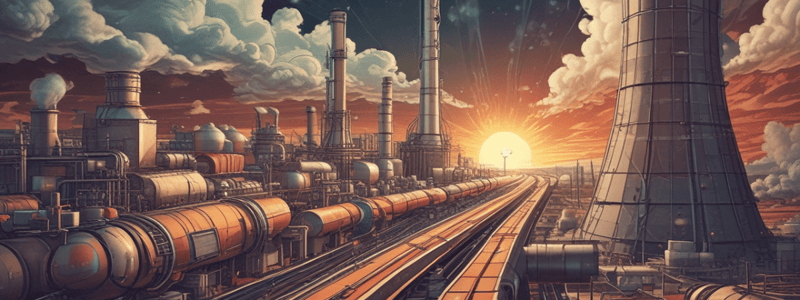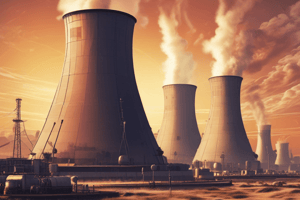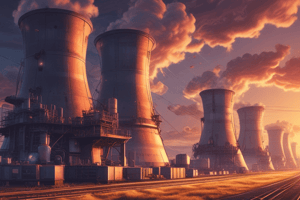Podcast
Questions and Answers
What is the primary purpose of releasing steam in a nuclear power plant?
What is the primary purpose of releasing steam in a nuclear power plant?
- To increase the pressure in the reactor
- To cool the reactor core
- To turn a steam turbine and produce electricity (correct)
- To produce electricity directly
What percentage of the world's electricity is generated by nuclear power plants?
What percentage of the world's electricity is generated by nuclear power plants?
- 10% (correct)
- 25%
- 20%
- 5%
Who published the famous equation that enables the calculation of the amount of energy per unit of mass?
Who published the famous equation that enables the calculation of the amount of energy per unit of mass?
- Erwin Schrödinger
- Albert Einstein (correct)
- Marie Curie
- Niels Bohr
What is the term for the difference in mass between the reactants and products of a nuclear reaction?
What is the term for the difference in mass between the reactants and products of a nuclear reaction?
What is a significant benefit of nuclear energy in the context of climate change?
What is a significant benefit of nuclear energy in the context of climate change?
What is the approximate energy equivalent of one fuel pellet of uranium?
What is the approximate energy equivalent of one fuel pellet of uranium?
What is a field of medicine that uses radioactive tracers to produce clear images of the body?
What is a field of medicine that uses radioactive tracers to produce clear images of the body?
What is a significant downside of nuclear energy?
What is a significant downside of nuclear energy?
What is the purpose of the turbine in a nuclear power plant?
What is the purpose of the turbine in a nuclear power plant?
What is the name of the scientist who published the equation that represents the concept of mass-energy equivalence?
What is the name of the scientist who published the equation that represents the concept of mass-energy equivalence?
Flashcards are hidden until you start studying
Study Notes
What is Nuclear Energy?
- Energy is the power necessary to do work or create force.
- Nuclear energy is a form of energy released from the nucleus of atoms.
- Two types of nuclear reactions produce nuclear energy: fission (splitting a nucleus) and fusion (combining nuclei).
Nuclear Fission and Fusion
- Nuclear fission: a large nucleus is split apart, releasing massive amounts of energy.
- Nuclear fusion: small nuclei are fused together, transforming them into a different element, releasing energy.
- Example of fusion: two hydrogen atoms combining to form helium, releasing energy.
- Fission: uranium decays into another element called plutonium, releasing massive amounts of energy.
Nuclear Power Plants
- Nuclear power plants use nuclear fission reactions to generate electricity.
- The first nuclear power plant, EBR-I, was switched on in 1951.
- Today, there are 445 operating nuclear power plants worldwide.
How Nuclear Power Plants Work
- Fuel rods containing uranium pellets are submerged in water to prevent the reaction from going out of control.
- The reaction releases heat, which is used to produce steam, turning a steam turbine, generating electricity.
Importance of Nuclear Energy
- Nuclear energy is important because it produces massive amounts of energy from a non-carbon source.
- One fuel pellet of uranium can create as much energy as 2,000 pounds of coal or 149 gallons of oil.
- Nuclear energy is used in medicine, space exploration, and powering submarines.
Risks and Downsides
- Nuclear fission produces radioactive waste, which can be radioactive for 1,000 to 10,000 years.
- The leftover waste can behave strangely, releasing radiation as it breaks down further.
Studying That Suits You
Use AI to generate personalized quizzes and flashcards to suit your learning preferences.




